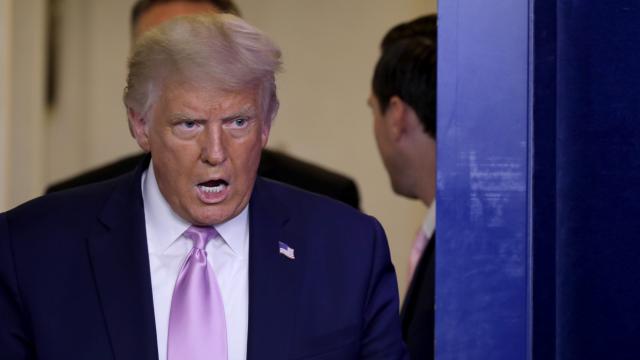How much does Donald Trump hate getting dunked on in his Twitter replies? So much so that amidst unprecedented global and domestic crises which you’d imagine would be more pressing concerns, he’s brought his fight against a handful of civilians on Twitter all the way up to the highest court in the land. Today, attorneys from the Department of Justice, acting on behalf of Donald Trump, the President, have asked the Supreme Court to overturn a federal appeals court’s ruling and allow him to smash that block button.
The battle started in July 2017, when the Knight First Amendment Institute at Columbia sued on behalf of seven Twitter users, including a surgeon, a police officer, a sociology professor, and a comedy writer. They successfully argued that Trump violated the First Amendment by denying access to an official channel of government communication. According to the Supreme Court petition, they had all posted replies to @realDonaldTrump that “generally expressed displeasure with the President” (though one told the New York Times that she’d never directed a single tweet at him). A New York federal appeals court upheld the decision last year, and the court denied him a rehearing this year.
“Twitter is not just an official channel of communication for the President; it is his most important channel of communication,” Judge Barrington D. Parker wrote earlier this year.
In a petition detailing the interactive functions of Twitter in depressing specificity for future generations, attorneys argue that Trump has been denied his hard-fought rights as Twitter user:
The blocking capability was available to President Trump because he is a registered Twitter user, not by virtue of his public office, and is available to him on the same terms that Twitter makes that capability available to all account holders.
They go on to paint a portrait of a debased microblogger stripped of his “authority” to block people on Twitter. While they admit that he “sometimes” makes official statements, his decision to block people is “always personal.” He should be allowed to have a social life, they say:
The result of the court of appeals’ novel ruling will be to jeopardize the ability of public officials — from the President of the United States to a village councilperson — to insulate their social-media accounts from harassment, trolling, or hate speech without invasive judicial oversight.
Through well-rehearsed mental gymnastics, they litigate the particulars of Twitter battles, strangely reckoning that the courts had erroneously focused on the content of his tweets, rather than the act of blocking itself, and that “the President uses his account to speak to the public, not to give members of the public a forum to speak to him and among themselves.”
They decline to mention that Twitter has a mute functions, which keeps those who you don’t follow from appearing in your notifications. Trump only follows 50 accounts. Effectively, Trump isn’t fighting for the right to ignore detractors, but to have detractors know they’re being ignored, further adding to the characterization of Trump as an inveterate gossip and a messy bitch who lives for drama.
Presuming the Supreme Court decides to hear the case, the term starts in October, and decisions aren’t typically announced until June of the following year. Perhaps he’ll get to block soon enough before it’s all over after all. Only a troll would fight so hard over something so stupid, but that’s what makes him the best.
